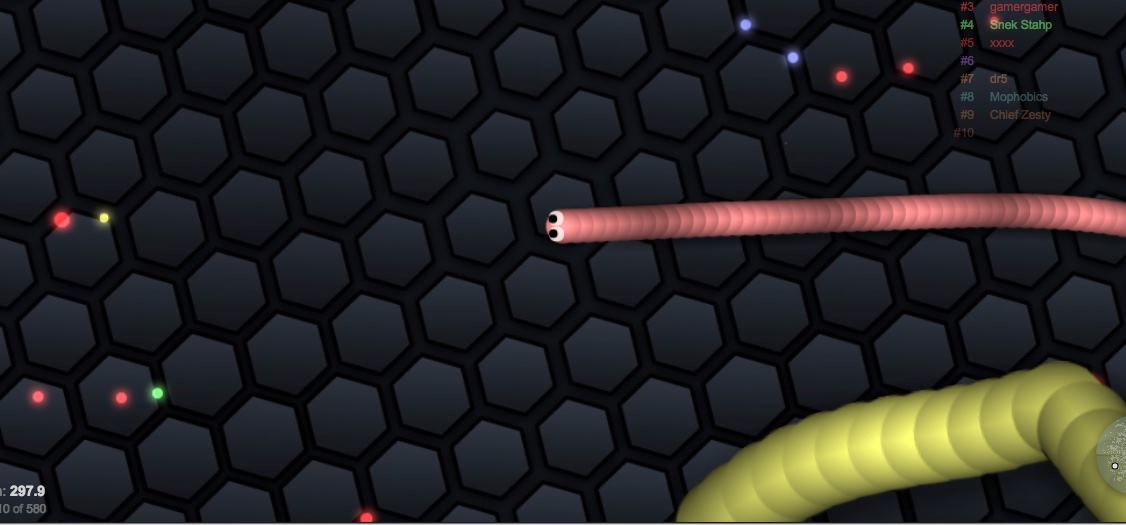The most popular game on the App Store - "Snake"
This is not the usual "Snake", and its MMORPG version

The statement “new is well forgotten old” is true for many things. This applies to technology, relationships and even games. At the moment, the first place in the rating of App Store toys is occupied by “Snake”, but not the usual one, but the MMORPG. The toy is simple, but colorful and fascinating (otherwise it would not have hit the first place in the rating, I suppose).
')
Slither.io takes the player to the world of oblique projection, divided by honeycomb-hexagons. There are a lot of bonuses on the field - food for a snake, which allows it to grow. There are also other reptiles that want one thing - to grow. Growth is almost unlimited, but you need to avoid collisions with other snakes. If you run against you - everything is fine, the enemy disappears, and in its place remains “food”. If someone bumps into you, then some other more successful player picks up your mortal remains.
It is interesting that the snake can not come across on itself (I remember, in the first version of the toy it also led to the loss). You can grow to a truly gigantic size - when you are still small, those giants that crawl around are surprising. The more you become, the harder it is to avoid collisions with other players.
The game itself is available not only as an application, but also as a web version (the link to it is given above). To understand how exciting the toy is, check out this video:
Let me remind you that the history of "Snakes" (Snake, Boa, etc.) has many decades. This computer game originated in the mid or late 1970s. As Wikipedia tells us , the first game of this plan was the Hustle slot machine, released by Gremlin in 1977. One of the first implementations (perhaps the first) on a home computer was made in 1979 on the TRS-80 computer, by F. Seger (Germany).

Shortly after, the Commodore version of the VIC-20, called Worms, was released. The microcomputer version of the Hustle game was released by Milton Bradley for the TI-99 / 4A computer in 1980. Versions of the game existed on many Soviet computers, for example, on Radio 86.

The statement “new is well forgotten old” is true for many things. This applies to technology, relationships and even games. At the moment, the first place in the rating of App Store toys is occupied by “Snake”, but not the usual one, but the MMORPG. The toy is simple, but colorful and fascinating (otherwise it would not have hit the first place in the rating, I suppose).
')
Slither.io takes the player to the world of oblique projection, divided by honeycomb-hexagons. There are a lot of bonuses on the field - food for a snake, which allows it to grow. There are also other reptiles that want one thing - to grow. Growth is almost unlimited, but you need to avoid collisions with other snakes. If you run against you - everything is fine, the enemy disappears, and in its place remains “food”. If someone bumps into you, then some other more successful player picks up your mortal remains.
It is interesting that the snake can not come across on itself (I remember, in the first version of the toy it also led to the loss). You can grow to a truly gigantic size - when you are still small, those giants that crawl around are surprising. The more you become, the harder it is to avoid collisions with other players.
The game itself is available not only as an application, but also as a web version (the link to it is given above). To understand how exciting the toy is, check out this video:
Let me remind you that the history of "Snakes" (Snake, Boa, etc.) has many decades. This computer game originated in the mid or late 1970s. As Wikipedia tells us , the first game of this plan was the Hustle slot machine, released by Gremlin in 1977. One of the first implementations (perhaps the first) on a home computer was made in 1979 on the TRS-80 computer, by F. Seger (Germany).

Shortly after, the Commodore version of the VIC-20, called Worms, was released. The microcomputer version of the Hustle game was released by Milton Bradley for the TI-99 / 4A computer in 1980. Versions of the game existed on many Soviet computers, for example, on Radio 86.
Source: https://habr.com/ru/post/393569/
All Articles